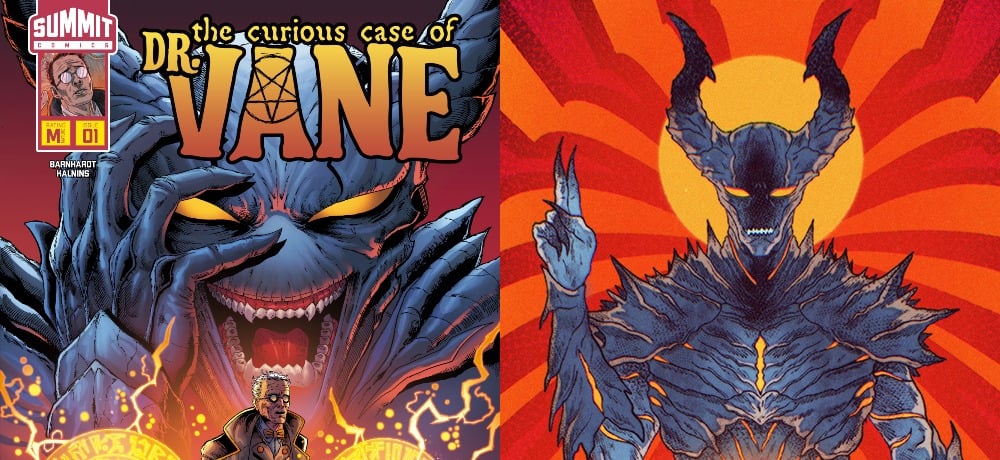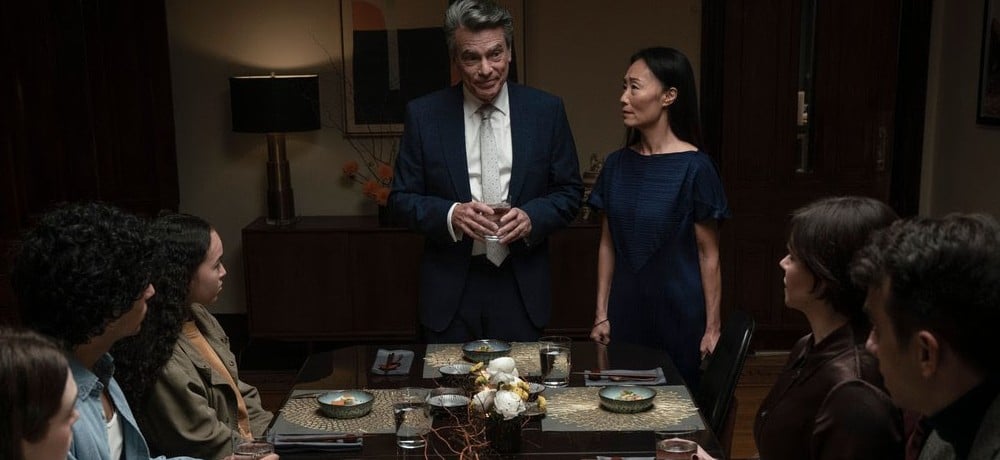






You’ve gotta hand it to Caitlin Cronenberg – it takes a lot of guts (probably wriggling, ropey, mutated ones) to slip into the director’s chair after not one, but two of your immediate family members have already managed to put their own gloopy red stamps on the horror genre’s proverbial map. Following in the footsteps of her father (and King of Venereal Horror) David, and younger brother Brandon, the third Cronenberg to tackle narrative filmmaking makes her feature debut with Humane, a dystopian family drama that may be short on visual inventiveness, but has plenty to say about the bitter realities of life on a planet spinning out of control.
In the near future, environmental collapse has led to a last ditch effort in which world governments must close their borders and reduce their respective populations by 20%. By encouraging citizens to sign up for voluntary euthanization, not only are countries able to meet their reduction goals, but those who “enlist” receive a large payout to set their loved ones up for future success. When retired newscaster Charles York (Peter Gallagher) and his celebrity chef wife Dawn Kim (Uni Park) gather their adult children for a lavish meal at their handsome estate, Jared (Jay Baruchel), Noah (Sebastian Chacon), Ashley (Alanna Bale), Rachel (Emily Hampshire), and their teenage granddaughter Mia (Sirena Gulamgaus) are shocked to discover that the two have enlisted. Though the siblings protest, Charles is hell-bent on going through with the procedure, even after Dawn gets cold feet and bolts – creating complications that lead to bloody unforeseen outcomes for the unhappy family.
Initially drafted by Michael Sparaga pre-pandemic, Humane’s eerie prescience tips closer to social-political critique in 2024 where we’ve seen “normalcy” plod on even as unprecedented events keep threatening to overturn it. The characters in Humane may carry foil-lined umbrellas to compensate for a depleted ozone layer, reminisce about the day the Amazon rainforest burned out of existence, or take note of a meal at which they enjoy contraband vegetables, but the drab everyday ordinariness of the situation and the ways in which the characters continue to go about their daily lives is what makes it all so unsettling. Buzzwords like “misinformation,” “systemic racism” and “undocumented immigrants” fly fast and loose in service of a fictional narrative that feels a little too close for comfort to fact, and the Yorks themselves are a portrait of a society slowly coming apart in microcosm. Though focused on the horrors of social and economic inequality rather than armed partisan conflict, those who found Alex Garland’s Civil War a little too laissez-faire in its ruminations on America’s political strife will find Humane refreshingly forthright.
Comparison with the work of her family members was always going to be half the battle for Caitlin Cronenberg, and unfortunately, Humane doesn’t quite rise to the challenge. Both David and Brandon are known for writing and directing their films, and though Sparaga’s screenplay is speculative, it lacks the existential and bodily concerns that have come to characterize the family name. On an aesthetic level, Humane is also worlds away from the cyberpunk surrealism of Possessor or the visionary clinical creepiness of David’s filmography. A photographer by trade, Caitlin’s work here is more than competent, but it’s hard not to wish she had leveraged her skills and stretched a bit farther to give the film a visual signature. Of course, Humane is the sort of single-locale endeavor that puts its human drama and performances front and center, but it’s so stylistically impersonal and indistinct that it’s difficult to know her as an artist beyond the choice to adapt this script. Still, the ability to direct actors is a foundational, underrated skill, and Cronenberg pulls solid work out of her performers, especially Chacon as the adoptive brother who feels like an outsider in his own family and the unassuming Enrico Colantoni giving one of the sneaky best villain performances so far this year as a government contractor for whom the enlistment process is less a duty than a sadistic thrill.
Humane is a penetrating near-future examination of contemporary issues. Michael Sparaga and the director build a frighteningly believable world upon a provocative central premise, and though the finale feels a bit too neat and tidy, the film’s grim humor functions like a balm when the questions it raises get too real. Ultimately, Humane is a watchable chamber piece that litigates how we value life – and decide whose lives even have value – under capitalist social structures while examining how quickly human beings adapt to extreme circumstances and the lies they tell themselves to keep muddling through.
Movie Score: 3/5